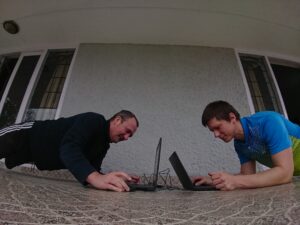Environmental pollution doesn’t take a break during Corona. So at econ we decided to continue with the commissioning plan and therefore the support of our partner in India. Under strictest health & safety measures, including frequent PCR tests and quarantine, two of our econeers set out to India to commission a VacuDry® 3,000 for the ex-situ on-site treatment of mercury contaminated soil.
Thomas and Mikhail report:
After a 24h trip from Munich via Dubai to Madurai, then onwards with a driver, Mr. Kanan, we arrived exhausted but safely at our destination in Kodaikanal in the state of Tamil Nadu. After a weeklong quarantine and taking multiple PCR tests, we have recently been able to visit the construction site for the first time to start with the installation of the VacuDry® plant. While in India, a chef and house assistant take diligent care of us, and we are glad to be driven to and from the site, given the sometimes rather chaotic traffic here.
We are impressed with the organizational skills of our Indian hosts. And while enjoying the comparatively warm climate in India, we make great progress on the site and will frequently report back with more information around our experience and the commissioning of the plant in the days and weeks to come.
When we are not working, we use the pleasant temperatures to go for a run or work out on the balcony – sometimes together at the same time 😉
Location
Kodaikanal is a small, by Indian standards very tranquil town in the state of Tamil Nadu in southern India and is located at an altitude of 2,200 m in the Palani Mountains. Especially during the summer months, Kodaikanal has been a popular vacation destination since colonial times due to its cool mountain climate. But because of the relatively low temperatures, a factory for mercury thermometers was located here in the 1980s. Even then, it was known that the higher the temperature, the more mercury could be released into the ambient air. But the relatively cool climate has not completely prevented the soil in the immediate vicinity of the factory from being contaminated with mercury. Even though the concrete health risk – compared to other environmental pollution in India – is comparatively low, the company wanted to set a good example in cleaning the soil here.
Here, again, VacuDry® enables the environmentally friendly and efficient separation of recyclables and pollutants, thus protecting the environment and human health.

Part 2: India Mission Assembly of a VacuDry® 3,000 accomplished
After taking a final picture of the fully assembled VacuDry® plant for the treatment of mercury-contaminated soils together with the local project managers and the installation team, my mission in India was successfully accomplished.
The econ team safely returns after an unforgettable trip filled with memories and hard work: hospitable colleagues, street markets in Tamil Nadu and plenty of working hours for the assembly of a VacuDry® 3,000 plant. The goal is to treat mercury contaminated soil caused by a former thermometer factory.
A big thank you to the two team members for going the extra mile to help the people in Kodaikanal to fight against mercury contamination that has plagued the area for years. Now, with the support of our engineers as well as the local team, the plant is set up on site, ready to start its work to “make mercury history” and to protect the local environment while also boosting the local economy.

Also on the plane, of course all passengers were wearing masks, but this is common practice everywhere now and does not ruin my good mood.
An unforgettable trip filled with memories in India in spite of the COVID 19 pandemic.








